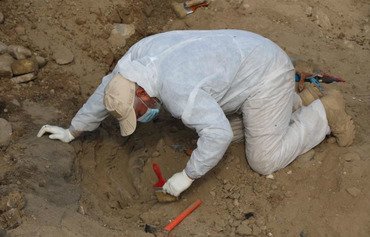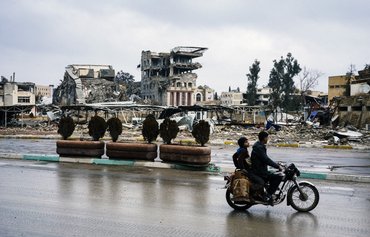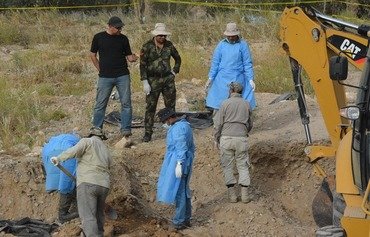BAGHDAD -- Iraq has arrested a suspect in one of the most notorious war crimes of the "Islamic State of Iraq and Syria" (ISIS), the June 2014 massacre of up to 1,700 captive cadets, authorities said Thursday (July 27).
After overrunning Tikrit Air Academy (Camp Speicher), the training site for thousands of cadets, ISIS elements separated the Shia and Christians from the other trainees and gunned them down one by one.
They dumped the bodies in mass graves or in the nearby Tigris river.
The interior ministry identified the suspect as Abdelkhalek Khazaal Soltan and said he had been arrested in a joint operation by the federal intelligence services and counter-terrorism police in Sulaimaniyah, in Iraq's Kurdish region.
![Iraqi security forces inspect a Tigris river waterfront in Tikrit on April 1, 2015, which is believed to be the place of the June 2014 Camp Speicher massacre, where hundreds of army cadets were slaughtered by ISIS. [Younis al-Bayati/AFP]](/cnmi_di/images/2023/07/27/43226-iraq-speicher-tigris-600_384.jpg)
Iraqi security forces inspect a Tigris river waterfront in Tikrit on April 1, 2015, which is believed to be the place of the June 2014 Camp Speicher massacre, where hundreds of army cadets were slaughtered by ISIS. [Younis al-Bayati/AFP]
![Iraqi soldiers carry coffins containing the remains of 10 of their comrades, who were killed in the 2014 Camp Speicher massacre, during their funeral procession in Najaf on July 1, 2015. The remains were handed over to relatives following weeks of examination to check their identities via DNA tests. [Haidar Hamdani/AFP]](/cnmi_di/images/2023/07/27/43227-speicher-funeral-iraq-600_384.jpg)
Iraqi soldiers carry coffins containing the remains of 10 of their comrades, who were killed in the 2014 Camp Speicher massacre, during their funeral procession in Najaf on July 1, 2015. The remains were handed over to relatives following weeks of examination to check their identities via DNA tests. [Haidar Hamdani/AFP]
Soltan joined ISIS in 2013, ministry spokesman Gen. Saad Maan said.
He allegedly "took part in several operations targeting the security forces... and participated in the Camp Speicher massacre of which he was one of the perpetrators", Maan said.
The Iraqi courts have handed down dozens of death sentences against those convicted of taking part in the atrocity.
In January, 14 people were sentenced to death for their part in it. In 2016, Iraq hanged 36 men convicted of carrying out the killings.
Victims of all sects
ISIS victims of all sects can be found in the group's mass graves, Fadel al-Gharawi of Iraq's Independent High Commission for Human Rights told Al-Mashareq in 2017.
"Mass graves can be found at Camp Speicher, Tuz Khurmatu and Bashir in Salaheddine and Kirkuk provinces, where all the victims were Shia," he said.
But the group also targeted Sunnis who opposed it, he said, and their bodies can be found in mass graves in al-Alam, Fallujah and Diyala, while several mass graves containing the remains of Yazidi victims have been found in Sinjar.
"Iraqi society as a whole was on the ISIS hit list," al-Gharawi said.
When Tikrit was liberated from ISIS, in April 2015, stories of mass graves began to emerge.
"Our only goal was to find the remains of our son," said Mohammed al-Aboudi, who in 2017 tearfully received the remains of his son, Kamal, which had been exhumed from a mass grave in Salaheddine province.
In 2014, Kamal had been undergoing military training at Camp Speicher when the province fell into the hands of ISIS, his father told Al-Mashareq.
"We knew he was killed by the terrorists because we saw him in one of the videos released by the group," al-Aboudi said. "He was among other soldiers who were being taken for execution, but we did not see him get executed."
When the mass grave was exhumed earlier that year, al-Aboudi gave the forensic lab in Baghdad a DNA sample so it could be compared against the hundreds of other bodies that were found at the site.
Kamal's body was identified and was returned to the family.
"It really was not a body but a bunch of featureless bones," al-Aboudi said, but it enabled the family to reinter him in a marked location.
"I thank God that Kamal now has a grave that we can visit every Eid," he said.
Holding ISIS accountable
United Nations (UN) Security Council Resolution 2379, adopted September 21, 2017, asked the UN secretary-general to establish an independent investigative team to support domestic efforts to hold ISIS accountable for its actions in Iraq.
The resulting UN Investigative Team to Promote Accountability for Crimes Committed by ISIS (UNITAD) began its fieldwork five years ago.
The team has been collecting, preserving and storing evidence of acts that may amount to war crimes, crimes against humanity and genocide committed by ISIS in Iraq.
It operates with full respect for Iraq's sovereignty and jurisdiction over crimes committed on its territory, and includes Iraqi investigative judges and other criminal experts, who work alongside international experts.
In May 2019, UNITAD completed its probe into the Tikrit Air Academy massacre.
"War crimes" were committed during the slaughter of the "predominantly Shia unarmed air cadets" and their instructors, UN investigators said in a 2021 report to the Security Council.
These included "murder, torture, cruel treatment and outrages upon personal dignity", the investigators said.

![An Iraqi man cries over body bags containing the remains of people believed to have been slain by ISIS on the ground at Camp Speicher in the Iraqi city of Tikrit, on April 12, 2015. [Ahmad al-Rubaye/AFP]](/cnmi_di/images/2023/07/27/43225-iraq-mourner-speicher-600_384.jpg)






